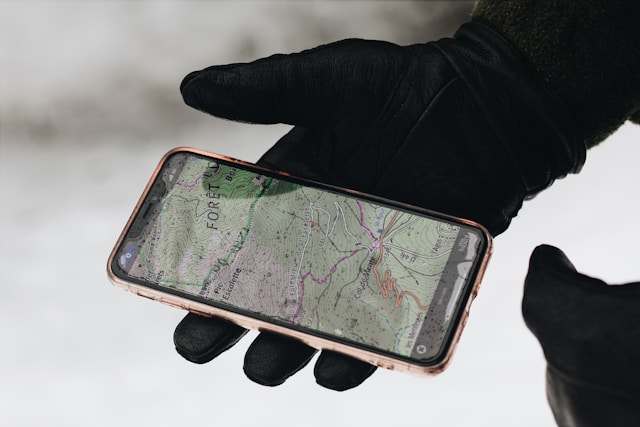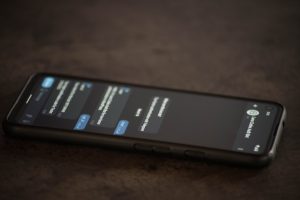Tracking Your Phone Is Easier Than You Think

Now that we’re well into the 21st century, our reliance on technology has become second nature—especially when it comes to our phones. We store our entire lives in these little devices we carry everywhere: passwords, credit card information, important dates, private conversations, and reminders we rely on to function.
The unsettling truth? Tracking a phone is far easier—and more common—than most people realize.
From jealous partners to disgruntled employees to criminal hackers targeting your business, the right tools can allow anyone to monitor your phone. That means reading your messages, accessing sensitive business data, and even tracking your location—without you ever knowing. For business owners, this doesn’t just put your personal privacy at risk—it threatens your operations, your clients, and your reputation.
How Does Phone Tracking Work?
Phone tracking can happen in several ways:
-
Spyware apps: These apps can monitor calls, texts, and app usage—or even activate your mic or camera. Many run silently in the background and can be installed without your knowledge.
-
Phishing links: A single malicious link in an email or text can install malware on your device the moment you click it.
-
Location sharing: Apps and social platforms you’ve forgotten about—or those with excessive permissions—might be sharing your location in the background without your awareness.
-
Stalkerware: A particularly sneaky form of spyware, this software is often disguised as a harmless settings tool or utility app designed to hide in plain sight.
The scariest part? Advanced hacking skills aren’t even required. Many of these tools are marketed as “monitoring software” and are legally sold online.
Why This Matters for Business Owners
 As a business owner, your phone likely holds more than just personal information. You often store client communications, saved passwords, emails, banking details, and other sensitive data right in the palm of your hand.
As a business owner, your phone likely holds more than just personal information. You often store client communications, saved passwords, emails, banking details, and other sensitive data right in the palm of your hand.
If your phone is compromised, it’s like handing over the keys to your business.
And the worst part? You probably won’t know it’s happening until it’s too late—after an account has been drained, a deal sabotaged, or a client relationship irreparably damaged.
To put it in perspective: the average cost of a single data breach for a small business is around $120,000—and that doesn’t even include regulatory fines (think HIPAA, FINRA, or PCI). If your phone is the weak point, that breach could start in your pocket at any moment.
Signs Your Phone Might Be Tracked
Spyware creators build these tools to stay hidden (it is ‘spy’ ware, after all), but your phone can still show signs of trouble:
-
Sudden or rapid battery drain
-
Unexpected spikes in data usage
-
Phone running hot when idle
-
Unexplained apps or icons appearing
-
Background noise or static during calls
-
Frequent crashes, lag, or unresponsive screens
You shouldn’t assume your phone is compromised based on one symptom—but if you notice several unusual behaviors at once, take action immediately.
How to Stop Phone Tracking
If something feels off, don’t wait. Here’s what to do:
-
Run a security scan
Use a reputable mobile security app to scan your phone for spyware or malware. These tools can alert you to threats, remove unwanted software, and monitor future activity in real-time. -
Check app permissions
Go through your apps and review what they have access to. Disable location, mic, and camera access for apps that don’t need it—especially ones you rarely use. -
Update your phone
Software updates often include security patches that close vulnerabilities. Keeping your OS and apps updated is one of the easiest ways to stay protected. -
Factory reset (if needed)
If you confirm spyware is present and can’t remove it, a factory reset is your most secure option. Be sure to back up critical data and change your passwords afterward. -
Set up stronger security controls
Use unique passwords for each account, enable 2-factor authentication (2FA), and never reuse login credentials across multiple platforms.
Don’t Leave Your Phone—Or Your Business—Exposed
Your phone isn’t just a personal device. It’s a mobile command center, a client file cabinet, and sometimes a digital vault. Keeping it secure isn’t optional—it’s nonnegotiable.
Cyber-criminals are opportunists. A compromised mobile device gives them easy access—no firewall required.
If you’re serious about protecting your data, your team, and your clients, start with a FREE Network Risk Analysis. We’ll help identify hidden vulnerabilities in your systems and devices. The we will show you how to close the gaps—before someone else finds them. Call us for IT Support in Medford, Ashland, Grants Pass, Eugene, Albany and Salem areas.
Click here to schedule your no-cost risk analysis today.
